
Former President Donald Trump is rekindling discussions surrounding trade wars, particularly as the 2024 presidential election race heats up. Trump's recent focus on tackling China has significant implications for both American businesses and the global economic landscape. One of the companies at the heart of this renewed scrutiny is Shein, the fast-fashion retailer that has swiftly risen to prominence by offering ultra-affordable clothing to young consumers.
Amid Trump's rhetoric, Shein represents both a success story and a point of contention in the ongoing debates about American manufacturing, labor practices, and the influence of foreign companies in the U.S. market. As Shein continues to capture market share, concerns over its supply chain, which heavily relies on Chinese factories, have fueled discussions about dependence on overseas production and the need for stricter trade regulations.
Trump's campaign has already begun to leverage these themes, positioning himself as a defender of American workers and industries. His assertion that trade wars might be necessary to protect U.S. interests shines a light on the complex dynamics involving companies like Shein, which many view as a challenge to traditional retail and manufacturing sectors in the United States.
As Shein's popularity grows among shoppers for its trendy apparel and incredibly low prices, there has also been increasing pushback from various stakeholders. Critics argue that the retailer's business model, heavily reliant on fast production and shipping from China, undermines American manufacturers and perpetuates poor labor conditions abroad. Trump's newfound focus on trade wars suggests that these concerns could escalate in the political discourse leading up to the election.
The trade war narrative has potential implications beyond Shein, affecting a wide array of industries tied to international trade and manufacturing. As the election approaches, expect to see intensifying debates on tariffs, foreign investment, and regulatory measures aimed at ensuring that American businesses are not undermined by cheaper imports.
Ultimately, Trump's approach to trade may define how the issues of globalization and economic fairness resonate with voters. With Shein symbolizing both innovation and controversy, the political discourse surrounding the retailer could shape the narrative on U.S.-China relations and trade policies heading into the elections.
As this situation develops, the relationship between American consumers, political decisions, and global economics will remain a topic of keen interest, particularly as candidates seek to assert their stances on trade in response to voter concerns.
With the Trump trade narrative gaining traction, Shein finds itself at a crossroads, representing both the allure of cheap fashion and the broader implications of America's reliance on foreign manufacturing. This story is likely to evolve, and its impact on the upcoming elections could be significant.
#TrumpTradeWar #Shein #FastFashion #USChinaRelations #2024Elections #AmericanManufacturing #GlobalEconomics
Author: Liam Carter




